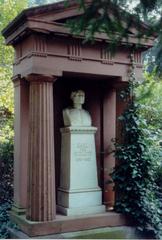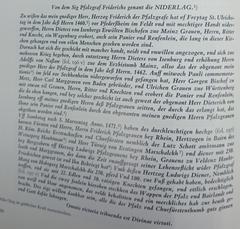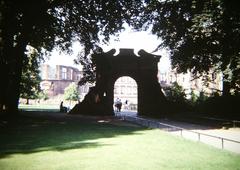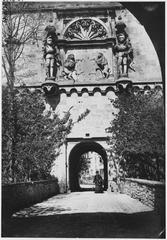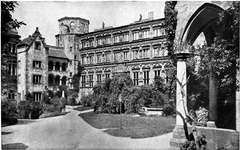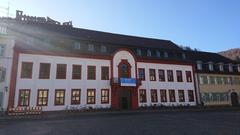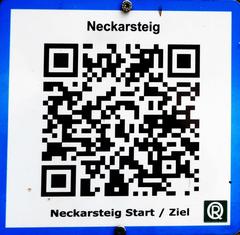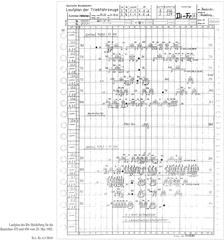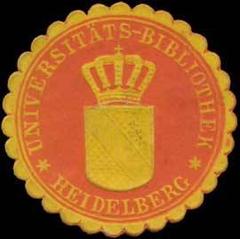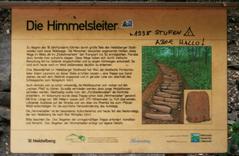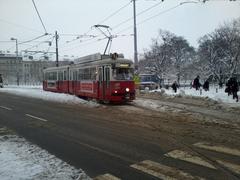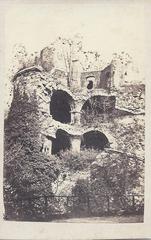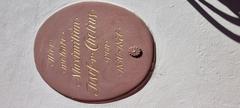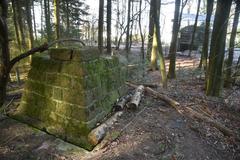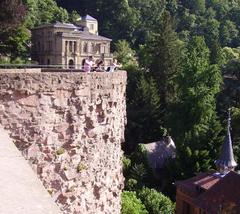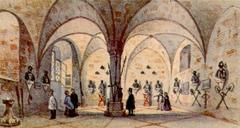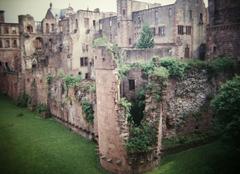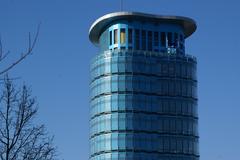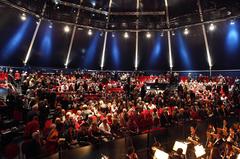Astronomical Calculation Institute Heidelberg: Visiting Hours, Tickets, and Comprehensive Visitor Guide
Date: 14/06/2025
Introduction
The Astronomical Calculation Institute (Astronomisches Rechen-Institut, ARI) in Heidelberg is a premier destination for those fascinated by the cosmos, scientific heritage, and the evolution of astronomical research. Established in 1700 and now integrated into Heidelberg University’s Center for Astronomy (Zentrum für Astronomie der Universität Heidelberg, ZAH), the ARI continues to play a pivotal role in international astronomy, from the production of star catalogs to leadership in space missions such as the European Space Agency’s Gaia project.
This guide brings together everything you need to plan a meaningful visit: historical context, up-to-date visitor information, accessibility, and tips for making the most of your experience in Heidelberg’s vibrant academic and cultural landscape.
For the latest updates on events, tours, and practical details, refer to the ARI Official Website and Heidelberg Tourism.
Table of Contents
- About the Astronomical Calculation Institute
- Visitor Information
- Location and Accessibility
- Unique Visitor Experiences
- Nearby Attractions
- Frequently Asked Questions (FAQ)
- Practical Tips for Tourists
- Historical Background and Scientific Achievements
- Notable Projects and Ongoing Research
- Visual and Digital Resources
- Plan Your Visit
- References
About the Astronomical Calculation Institute
Founded in Berlin by Gottfried Kirch in 1700 under the patronage of Frederick I of Prussia, the Astronomical Calculation Institute has been a cornerstone of celestial mechanics, astrometry, and computational astrophysics for over three centuries. After its relocation to Heidelberg in 1945, the ARI became a hub for precision star catalogs, orbit calculations, and modern astronomical research. Since 2005, it has formed an integral part of Heidelberg University’s Center for Astronomy (ARI Official Website).
Visitor Information
Visiting Hours
- General Hours: As a working research institute, the ARI does not maintain regular public visiting hours. However, the institute hosts public outreach events, lectures, and open days, typically announced on the ARI Events Page.
- Best Practice: Always check the official website and event calendar before planning your visit.
Admission and Tickets
- General Admission: Access to public events and open days is generally free of charge.
- Special Events: Some workshops or guided tours may require advance registration or a nominal fee.
- Booking: Guided tours and group visits should be arranged in advance via the ZAH Heidelberg website or by directly contacting ARI.
Guided Tours and Events
- The ARI offers guided tours during special open days or by appointment for groups. These tours provide insights into the institute’s history, research, and facilities.
- Educational workshops and public lectures are periodically available, particularly during outreach weeks and summer schools.
Location and Accessibility
- Address: Astronomisches Rechen-Institut, Mönchhofstr. 12-14, 69120 Heidelberg, Germany.
- Getting There: The institute is within Heidelberg’s Neuenheim district, easily accessible by tram lines 5 and 21 (stop: “Universität”) or by foot and bicycle from the city center.
- Accessibility: The ARI is fully wheelchair accessible. Visitors with additional needs are encouraged to contact the institute before arrival for tailored assistance.
Unique Visitor Experiences
- Interactive Exhibits: During open days, visitors can explore historical star catalogs, astronomical instruments, and high-performance computing resources.
- Virtual Tours: The ARI offers digital access to select resources, including virtual observatory platforms and databases such as SIMBAD and VizieR.
- Public Lectures: Regular lectures and workshops introduce current research topics, from Gaia mission findings to the latest on exoplanet discoveries.
Nearby Attractions
- Heidelberg Castle: One of Germany’s most famous ruins offering panoramic views of the city.
- Old Town (Altstadt): Explore charming cafes, shops, and historic streets along the Neckar River.
- Max Planck Institute for Astronomy: Another key center for astronomical research.
- Haus der Astronomie: Dedicated to public outreach and education in astronomy and astrophysics.
- State Observatory Königstuhl (Landessternwarte): Home to historic telescopes and research programs (Max Planck Institute for Astronomy).
Frequently Asked Questions (FAQ)
Q: What are the ARI’s visiting hours?
A: The ARI does not offer daily public visiting hours. Access is available during open days, public events, and by appointment.
Q: Is there an admission fee?
A: Most events are free, though some specialized programs may require registration.
Q: Are guided tours available?
A: Yes, but only during public events or if arranged in advance for groups.
Q: Is ARI accessible for visitors with disabilities?
A: Yes, the institute is fully accessible. Please communicate any additional needs before your visit.
Q: Can I take photographs?
A: Photography is generally permitted in public areas during events; restrictions may apply for certain exhibits.
Practical Tips for Tourists
- Check Event Schedules: Plan your visit around open days, public lectures, or guided tours by monitoring the ARI events page.
- Combine with Other Attractions: Extend your scientific exploration by visiting the State Observatory, Max Planck Institute, or the Haus der Astronomie.
- Language: Events are typically in English and German. Confirm language options when registering.
- Local Amenities: The Neuenheim district offers a range of cafes and green spaces for relaxation before or after your visit (Johnny Africa travel guide).
Historical Background and Scientific Achievements
The ARI’s legacy includes the creation of foundational star catalogs (FK series, Gliese Catalog of Nearby Stars), contributions to the International Celestial Reference System, and leadership in data analysis for missions like Gaia. Its research spans cosmology, stellar dynamics, galactic evolution, and the development of astronomical reference systems. ARI’s computational innovations and international collaborations cement its status as a world-class institution (ARI official site, ZAH news).
Notable Projects and Ongoing Research
- Gaia Mission: Central role in data processing and publication, with more than 12,600 Gaia-based papers published as of 2025.
- Exoplanet Discoveries: Participation in the CARMENES project, which identified a high frequency of Earth-like planets around low-mass stars.
- Cosmic Turbulence Mapping: Recent studies on energy transfer in the interstellar medium.
- Galaxy Cluster Simulations: ARI has published the largest data sets on massive galaxy cluster formation (ZAH news).
Visual and Digital Resources
ARI also offers digital resources and virtual tours via their official website, making their archives and research accessible worldwide.
Plan Your Visit
- Monitor Announcements: Public events and open days are your best opportunity to experience the ARI firsthand. Details are posted on the ARI official website and ZAH Heidelberg.
- Download the Audiala App: For interactive maps, event notifications, and personalized guides for Heidelberg’s scientific sites.
- Stay Connected: Follow ARI and ZAH on social media for up-to-date news, research highlights, and event invitations.
References and Further Reading
- ARI Official Website
- ZAH Heidelberg – Studying Astronomy
- ARI Events and News
- Johnny Africa Travel Guide to Heidelberg
- Max Planck Institute for Astronomy
- Heidelberg Institute for Theoretical Studies
- IMPRS-HD Summer School
- Rick Steves Germany Travel Forum
Final Thoughts
The Astronomical Calculation Institute offers a unique window into the universe’s mysteries and the human pursuit of knowledge. Whether you attend a public lecture, join a guided tour, or explore its digital archives, the ARI is a testament to scientific excellence and collaboration. Make it a memorable stop on your Heidelberg journey—immerse yourself in the intersection of history, science, and culture that defines this remarkable institution.
